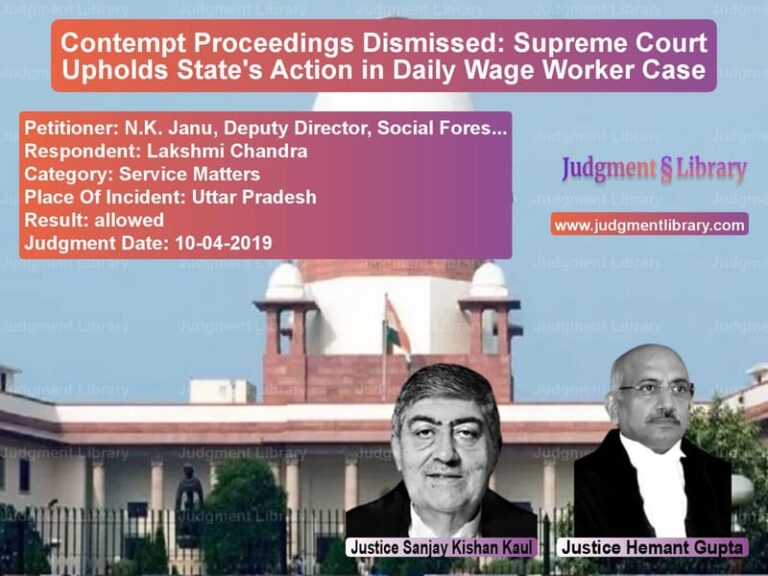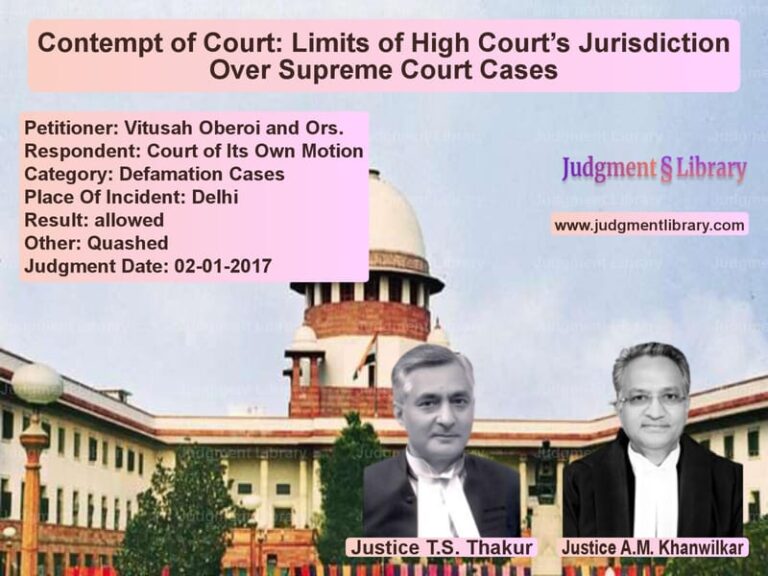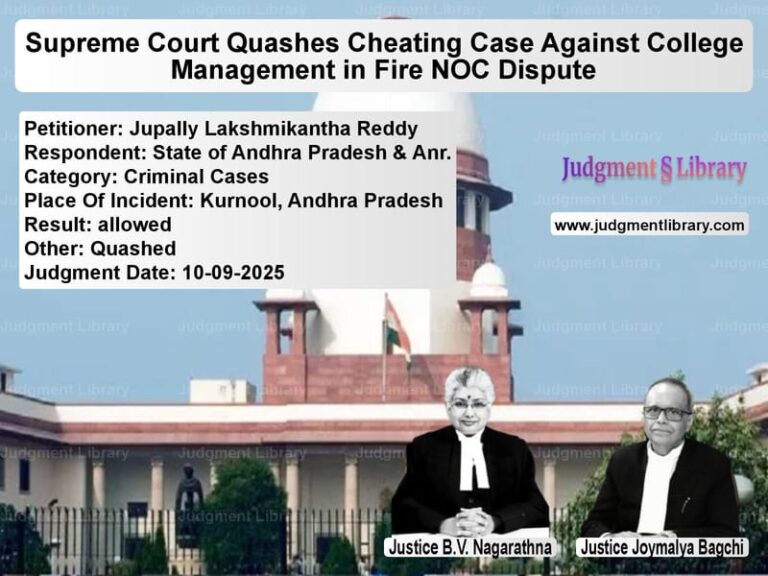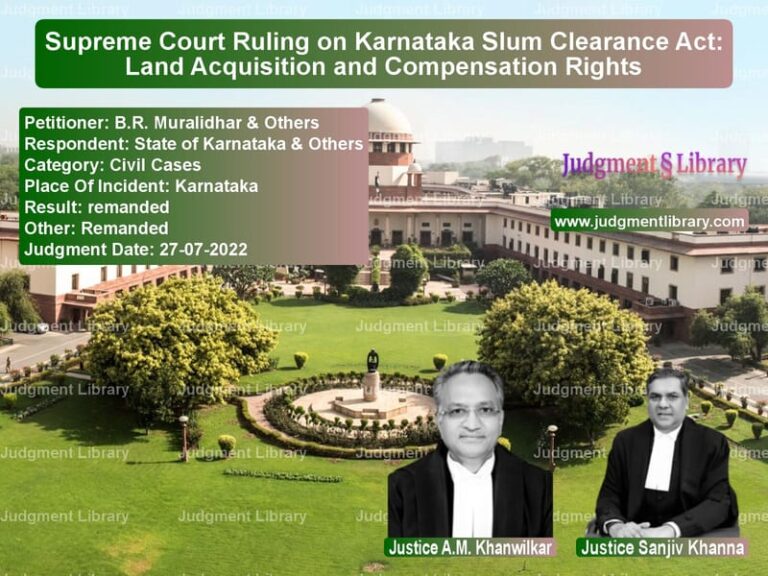Bihar Caste Reservation Case: Supreme Court Quashes Inclusion of ‘Tanti-Tantwa’ in Scheduled Caste List
The Supreme Court of India recently delivered a significant judgment in Dr. Bhim Rao Ambedkar Vichar Manch Bihar, Patna vs. The State of Bihar & Others, striking down the Bihar government’s 2015 resolution that merged the ‘Tanti-Tantwa’ caste with the Scheduled Caste (SC) list under the category of ‘Pan/Sawasi.’ The ruling reaffirmed that only Parliament has the authority to modify the SC list under Article 341 of the Constitution.
Background of the Case
The dispute originated from a Bihar government resolution dated July 1, 2015, which removed ‘Tanti-Tantwa’ from the Extremely Backward Classes (EBC) list and merged it with the Scheduled Caste category under ‘Pan/Sawasi.’ This move was challenged by several petitioners, arguing that state governments lack the constitutional authority to alter the SC list.
The Patna High Court upheld the state government’s decision, prompting the present appeal before the Supreme Court.
Key Issues Before the Supreme Court
- Whether the Bihar government had the authority to merge ‘Tanti-Tantwa’ with the SC list.
- Whether the 2015 resolution violated Article 341 of the Constitution.
- What should be done with those who benefited from the reservation under the impugned resolution?
Arguments by the Petitioners
The petitioners, represented by senior counsel, argued that:
- Under Article 341, only the President of India, in consultation with the Governor, can specify which castes are included in the SC list.
- Any modification or addition to the SC list can only be done by Parliament through legislation.
- The Bihar government’s 2015 resolution was unconstitutional as it attempted to alter the SC list without parliamentary approval.
- By issuing SC certificates to ‘Tanti-Tantwa’ individuals, the state government violated central guidelines, depriving legitimate SC members of their rightful benefits.
- The Union Government had repeatedly informed the Bihar government that ‘Tanti-Tantwa’ was not part of the SC list and could not be treated as such.
Arguments by the Respondents (State of Bihar)
The Bihar government and private respondents defended the resolution, arguing that:
- ‘Tanti-Tantwa’ was already considered synonymous with ‘Pan/Sawasi’ in Bihar.
- The resolution was merely “clarificatory” and did not alter the SC list.
- Various sociological and historical studies, including reports from state commissions, supported the view that ‘Tanti-Tantwa’ belonged to the same social group as ‘Pan/Sawasi.’
- The state was acting on recommendations from the Bihar State Commission for Backward Classes.
- Those who had already benefited from the reservation under the resolution should not be affected by its annulment.
Supreme Court’s Ruling
The Supreme Court held that the Bihar government’s resolution was unconstitutional and in direct violation of Article 341 of the Constitution. The key findings included:
- Article 341 mandates that any changes to the SC list can only be made through legislation passed by Parliament.
- The Bihar government had no authority to alter the SC list by merging ‘Tanti-Tantwa’ with ‘Pan/Sawasi.’
- Past sociological studies and state commission reports could not override constitutional provisions.
- The resolution deprived legitimate SC members of their rightful benefits.
- Issuing SC certificates to ‘Tanti-Tantwa’ members was illegal and in defiance of central government instructions.
The Court ruled:
“Whether synonymous or not, any inclusion or exclusion of any caste, race, or tribe or part of or group within them has to be made by law enacted by Parliament, and not by any other mode or manner.”
Impact on Those Who Received Benefits
While striking down the 2015 resolution, the Court addressed concerns regarding individuals who had already benefited from SC reservations under the invalidated resolution:
- Appointments made under the SC quota using ‘Tanti-Tantwa’ certificates should be returned to legitimate SC candidates.
- ‘Tanti-Tantwa’ members should be accommodated under their original EBC category.
- No recoveries would be made from individuals who had already availed benefits under the invalidated resolution.
The Court stated:
“The action of the State is found to be mala fide and de hors the constitutional provisions. The State cannot be pardoned for the mischief done by it.”
Key Takeaways from the Judgment
- State Governments Cannot Alter the SC List: The ruling reaffirms that only Parliament has the power to amend the SC list under Article 341.
- Unconstitutional Government Actions Have Consequences: The judgment emphasizes that states cannot unilaterally alter reservation policies.
- Protection for Beneficiaries of Invalidated Orders: While the resolution was struck down, individuals who had benefited from it will not face penal consequences.
- Judicial Oversight on Reservation Policies: Courts will intervene when states act beyond their constitutional authority in matters of caste-based reservations.
Conclusion
The Supreme Court’s judgment serves as a landmark ruling on caste-based reservations, reinforcing the constitutional principle that modifications to the SC list must be made by Parliament, not state governments. The ruling not only restores constitutional order but also ensures that caste-based benefits reach the right beneficiaries without undue political interference.
Petitioner Name: Dr. Bhim Rao Ambedkar Vichar Manch Bihar, Patna.Respondent Name: The State of Bihar & Others.Judgment By: Justice Vikram Nath, Justice Prashant Kumar Mishra.Place Of Incident: Bihar.Judgment Date: 15-07-2024.
Don’t miss out on the full details! Download the complete judgment in PDF format below and gain valuable insights instantly!
Download Judgment: dr.-bhim-rao-ambedka-vs-the-state-of-bihar-&-supreme-court-of-india-judgment-dated-15-07-2024.pdf
Directly Download Judgment: Directly download this Judgment
See all petitions in Fundamental Rights
See all petitions in Constitution Interpretation
See all petitions in Public Interest Litigation
See all petitions in Judgment by Vikram Nath
See all petitions in Judgment by Prashant Kumar Mishra
See all petitions in allowed
See all petitions in Quashed
See all petitions in supreme court of India judgments July 2024
See all petitions in 2024 judgments
See all posts in Constitutional Cases Category
See all allowed petitions in Constitutional Cases Category
See all Dismissed petitions in Constitutional Cases Category
See all partially allowed petitions in Constitutional Cases Category







